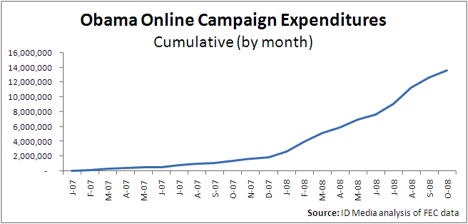I hear a lot of political professionals buzzing these days about the Obama online campaign. That’s a good thing. It seems that Obama’s victory (enabled, in part, by an aggressive online campaign) was the watershed event that the political world needed to finally recognize the internet as powerful political medium.
The last major watershed event of this kind was nearly 50 years ago for television with the televised Kennedy/Nixon debates. Television quickly became the dominant medium for political communications and has continued its reign through the present day. So, it’s natural that many campaign professionals have come to see the world through the one-way, broadcast framework that television requires.
From data we compiled from the 2004 elections, it was clear that there was a disproportionate difference between dollars spent by campaigns on the internet as a percent of total media spending (1%) and the amount of time that Americans were spending on the internet vs. those other mediums (17%). This 17:1 imbalance represented a real opportunity for a campaign to embrace the internet vis-à-vis a competitor running a more “traditional media” campaign. Over the last four years, this analysis proved to be a powerful marketing tool for my business (a political internet agency), but it took the Obama watershed to bring about industry-wide recognition. Again, a very good thing.
But there is risk of a pendulum swinging from one extreme to the other. It seems the political world is swinging from undervaluing the internet’s role to placing unrealistic expectations on it. For me, this is a familiar phenomenon. I witnessed it during my work with internet startups a decade ago in the “dot-com” era. It was a time of irrational exuberance as many lofty expectations were set on the internet’s mantle. As was bound to happen, this hype led to a crash and years of disillusionment. And, just as online shopping never replaced physical stores, the online campaign won’t replace TV, radio, direct mail and good, old-fashioned campaigning in the political context (and it will be no less costly in many respects).
I feel compelled to author this post, because I’d like the political world to spare itself a hype/crash cycle with the internet. The best way to avoid that cycle is to close the “expectation gap” that I believe currently exists with respect to the internet’s role in the political process. By way of example, this expectation gap is quite pronounced with respect to building a base of grassroots supporters. The Obama campaign built an impressive army of supporters and many campaign professionals are understandably eager to do the same. But what most don’t see is the time and resources required to build a grassroots base.
In terms of time, the Obama campaign spent nearly two years investing in the online campaign. As the chart below shows, there was a long tail of investment in the online campaign in 2007; a period of time when the army of supporters was more slowly building.
 Obama Campaign Internet Expenditures
Obama Campaign Internet Expenditures
In terms of resources (money), Obama outspent McCain on the internet by more than three times ($14M vs. $4.6M, AND the Obama campaign spent a disproportionately higher percentage of their total campaign expenditures on the internet, based on FEC data). While campaign professionals focus on the end result of a well executed online campaign, they must also recognize the effort required to achieve that result.
With time, the internet will take its rightful place in the political milieu, but first, there are fundamental concepts for the political world to learn and embrace about this new (and elementally different) medium. In future posts, we’ll explore some of these concepts, including what it takes to fund and cultivate a successful internet campaign, the interaction between traditional media and internet media and some of the lessons we’ve learned over the past five years in running dozens of large-scale online campaigns.

